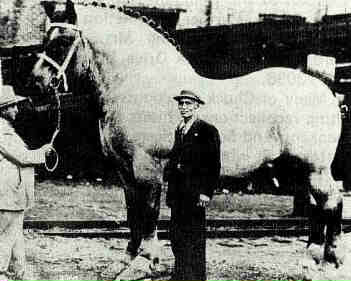Weight Reduction in Horses
This article is reprinted from The American Association
of Equine Practitioners. Headquartered in Lexington,
Kentucky, the AAEP was founded in 1954
as a non-profit organization dedicated to the health and
welfare of the horse.
As a horse owner, you play an important role in controlling
your equine companion’s weight. Sound nutrition management,
a regular exercise program and veterinary care are key. This
keeps your horse fit and healthy. Maintaining the ideal
weight is not always easy, however.
When implementing a weight loss program for the overweight
horse, it’s important to do it gradually and under the
supervision
of an equine veterinarian. Follow these guidelines from the
American Association of Equine Practitioners (AAEP)
to get you started:
1. Be patient. Weight reduction should be a slow, steady
process so not to stress the horse or create metabolic upsets.
2. Make changes in both the type and amount of feed
gradually. Reduce rations by no more than 10% over
a 7 to 10-day period.
3. Track your horse’s progress by using a weight tape.
When the horse’s weight plateaus, gradually cut back
its ration again.
4. Step up the horse’s exercise regimen. Gradually build time
and intensity as the horse’s fitness improves.
5. Provide plenty of clean, fresh water so the horse’s
digestive and other systems function as efficiently as
possible and rid the body of metabolic and other wastes.
6. Select feeds that provide plenty of high quality fiber
but are low in total energy. Measure feeds by weight rather
than by volume to determine appropriate rations.
7. Select feeds that are lower in fat since fat is an energy-
dense nutrient source.
8. Switch or reduce the amount of alfalfa hay feed. Replace
with a mature grass or oat hay to reduce caloric intake.
9. Feed separate from other horses so the overweight horse
doesn’t have a chance to eat his portion and his neighbor’s
too. In extreme cases of obesity, caloric intake may also
need to be controlled by limiting pasture intake.
10. Balance the horse’s diet based on age and activity level.
Make sure the horse’s vitamin, mineral and protein
requirements continue to be met.
Once your horse has reached its ideal body condition,
maintaining the proper weight is a gentle balancing act.
You will probably need to readjust your horse’s ration to
stabilize its weight. Exercise will continue to be a key
component in keeping the horse fit. Because obesity
can affect a horse’s health, communicate regularly with
your veterinarian. Schedule regular check-ups, especially
during the weight reduction process.
